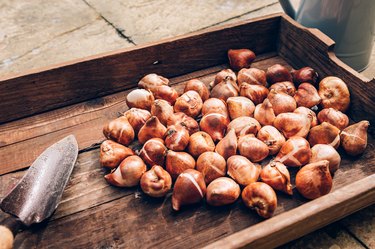
Tulips (Tulipa spp.) are normally grown from bulbs, but tulip lovers may enjoy experimenting with planting tulip seeds -- a project that takes a while. Seeds taken from the showy hybrids in your garden may occasionally sprout, but they rarely grow true to the parent plant. Species tulips, such as 'Tarda' (Tulipa 'Tarda'), produce viable seeds that grow true to the variety. Tulips are hardy in U.S. Department of Agriculture plant hardiness zones 4 through 10.
Preparing the Tulip Seed Pod
Video of the Day
After you allow the tulip seed pod to completely develop, harvest the seeds from the dried pod. Let the seeds finish drying on a plate in a warm location for at least one week before storing them in the refrigerator for 90 days. Place the seeds on a barely damp paper towel or in moist peat moss in a plastic bag for storage. Clearly label the bags with the species and cultivar name and date. Because tulips are native to the arid regions of eastern Europe and Central Asia, both the seeds and bulbs require a chilling period with temperatures between 32 and 45 degrees Fahrenheit to sprout and develop into plants.
Video of the Day
Prepare the Soil
To plant tulip seeds outdoors, prepare a cold frame by filling it with light sandy soil or a mixture of 3 parts potting soil and 1 part coarse sand. If you're starting the tulip seedlings indoors, fill flowerpots with a sterile seed-starting mix. Outdoors or in, moisten the soil thoroughly with water before you add the seeds.
In general, tulip seeds germinate in temperatures between 65 and 75 degrees Fahrenheit. If outdoor temperatures remain cold, the tulip seeds will sprout when the weather warms in the spring.
Planting the Seeds
Plant the tulip seeds in February. Scatter the seeds over the soil, placing them at least 2 inches apart, and cover them with 1/4 inch of soil. If you live in a mild winter area, such as USDA zones 8 through 10, plant the seeds in flowerpots so you can move them into the refrigerator at the end of the first growing season. Water as soon as the soil is dry to the touch. Depending on the variety, the seeds may germinate within a month to a year. Species tulips, such as 'Tarda,' generally germinate in one to two months.
After the Seeds Germinate
Remove the top of the cold frame as the temperature rises to avoid cooking the seedlings. Eight weeks after the seedlings appear, begin fertilizing weekly with a half strength dose of a balanced 10-10-10 fertilizer -- use 3/4 teaspoon per square foot, and water it in thoroughly. When the weather turns cold, cover the cold frame. In mild climates, move the flowerpots into a refrigerator for 90 days.
Do not transplant the new tulips for 18 months after the seedlings first appear. At this point, they have developed into small bulbs. Tulips grown from seed may not produce spring flowers for four to seven years. Overseed the flower bed with fast-growing annuals and plant shallow-rooted perennials to fill in until the tulips begin producing blossoms.